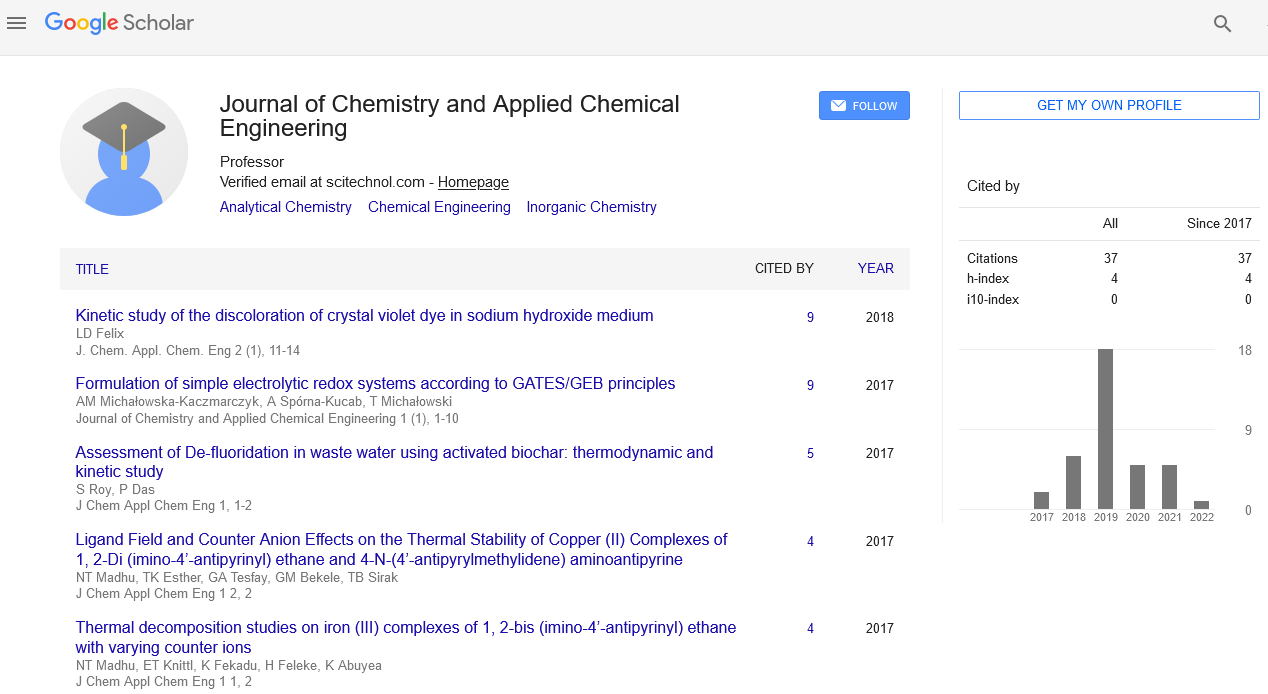Opinion Article, J Chem Appl Chem Eng Vol: 7 Issue: 2
Advancements in Complex Mixture Analysis for Chemical Insights
Christian Arner*
1Department of Medical Biochemistry, Karolinska Institute, Stockholm, Sweden
*Corresponding Author: Christian Arner,
Department of Medical Biochemistry,
Karolinska Institute, Stockholm, Sweden
E-mail: vrackodavid@gmail.com
Received date: 23 May, 2023, Manuscript No. JCACE-23-106812;
Editor assigned date: 25 May, 2023, Pre QC No. JCACE-23-106812 (PQ);
Reviewed date: 08 June, 2023, QC No. JCACE-23-106812;
Revised date: 15 June, 2023, Manuscript No. JCACE-23-106812 (R);
Published date: 22 June, 2023, DOI: 10.4172/Jcace.1000026
Citation: Arner C (2023) Advancements in Complex Mixture Analysis for Chemical Insights. J Chem Appl Chem Eng 7:2.
Description
Complex mixture analysis in chemistry is a challenging and crucial aspect of modern analytical chemistry. It involves the characterization and quantification of numerous components present in a mixture, which can range from simple mixtures like organic compounds to highly complex mixtures found in natural products, petroleum, environmental samples, and more. The analysis of complex mixtures is essential in various areas, including environmental monitoring, pharmaceutical research, food safety, forensic investigations, and industrial processes.
Challenges in complex mixture analysis
The analysis of complex mixtures presents several challenges, primarily due to the sheer number of components and their varying concentrations. Some common challenges include:
• Complex mixtures can contain hundreds or even thousands of different compounds with a wide range of chemical properties.
• Many analytical techniques produce signals that may overlap, making it difficult to resolve individual components accurately.
• The presence of matrix components can interfere with the detection and quantification of specific analytes.
• The concentrations of different components in a complex mixture can vary significantly, spanning several orders of magnitude.
• Often, complex mixtures may contain unknown or unexpected compounds, necessitating comprehensive and sensitive analytical approaches.
Analytical techniques for complex mixture analysis
• Several analytical techniques are employed in complex mixture analysis, each offering unique advantages and limitations. Some commonly used techniques include:
• Gas Chromatography-Mass Spectrometry (GC-MS) is a powerful technique for separating and identifying volatile and semi-volatile compounds in mixtures. It provides
• Liquid Chromatography-Mass Spectrometry (LC-MS) is suitable for analyzing non-volatile and polar compounds in complex mixtures. It is widely used in metabolomics, proteomics, and environmental analysis.
• Nuclear Magnetic Resonance (NMR) Spectroscopy provides valuable structural information about individual compounds in mixtures, particularly when combined with two-dimensional NMR techniques.
• Fourier-Transform Infrared (FT-IR) Spectroscopy is useful for identifying functional groups and structural features of compounds, making it suitable for mixture analysis.
• Inductively Coupled Plasma-Mass Spectrometry (ICP-MS) is employed for elemental analysis in complex mixtures, such as environmental samples and trace metal analysis.
• High-Performance Liquid Chromatography (HPLC) is utilized for separating and quantifying compounds in complex mixtures, often coupled with UV or fluorescence detectors.
Data analysis and chemometrics
Interpreting the vast amounts of data generated by complex mixture analysis is another significant challenge. Chemometrics, a branch of chemistry focused on extracting meaningful information from chemical data, plays a crucial role in data analysis for complex mixture analysis. Techniques like peak deconvolution, multivariate analysis, and statistical methods aid in identifying individual components and quantifying their concentrations accurately.
Applications of complex mixture analysis
Complex mixture analysis finds diverse applications across various fields of chemistry and beyond:
Environmental analysis: In environmental science, complex mixture analysis is essential for assessing air and water quality, detecting pollutants, and monitoring chemical contaminants in soil and sediment samples.
Pharmaceutical research: Complex mixture analysis is used in drug discovery and development to identify active compounds in natural products, assess drug formulations, and study drug metabolism.
Food safety and quality control: The analysis of complex mixtures in food products helps ensure their safety, quality, and compliance with regulatory standards.
Forensic investigations: Forensic scientists use complex mixture analysis to identify and quantify drugs, toxins, and other compounds in biological samples and crime scene evidence.
Petroleum and petrochemical industry: Complex mixture analysis is critical for characterizing crude oil, refining products, and identifying contaminants in petroleum samples.
Advances in complex mixture analysis
Advancements in instrumentation, data processing, and data interpretation have greatly enhanced complex mixture analysis in recent years. High-resolution mass spectrometry, hyphenated techniques, and powerful software tools have enabled more comprehensive and accurate analysis of complex mixtures.
Complex mixture analysis in chemistry is a fundamental and challenging field that plays a vital role in various scientific and industrial applications. The development and application of advanced analytical techniques, data analysis methods, and chemometrics continue to drive progress in this area. As our understanding of complex mixtures expands, the information gained from these analyses will continue to contribute significantly to environmental monitoring, drug development, food safety, and many other critical areas of research and industry.
 Spanish
Spanish  Chinese
Chinese  Russian
Russian  German
German  French
French  Japanese
Japanese  Portuguese
Portuguese  Hindi
Hindi 